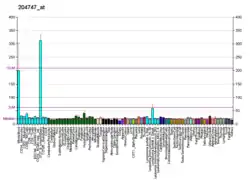IFIT3
Interferon-induced protein with tetratricopeptide repeats 3 is a protein that in humans is encoded by the IFIT3 gene.[5][6][7]
References
- GRCh38: Ensembl release 89: ENSG00000119917 - Ensembl, May 2017
- GRCm38: Ensembl release 89: ENSMUSG00000074896 - Ensembl, May 2017
- "Human PubMed Reference:". National Center for Biotechnology Information, U.S. National Library of Medicine.
- "Mouse PubMed Reference:". National Center for Biotechnology Information, U.S. National Library of Medicine.
- de Veer MJ, Sim H, Whisstock JC, Devenish RJ, Ralph SJ (Jan 1999). "IFI60/ISG60/IFIT4, a new member of the human IFI54/IFIT2 family of interferon-stimulated genes". Genomics. 54 (2): 267–77. doi:10.1006/geno.1998.5555. PMID 9828129.
- Zhu H, Cong JP, Shenk T (Jan 1998). "Use of differential display analysis to assess the effect of human cytomegalovirus infection on the accumulation of cellular RNAs: induction of interferon-responsive RNAs". Proc Natl Acad Sci U S A. 94 (25): 13985–90. doi:10.1073/pnas.94.25.13985. PMC 28419. PMID 9391139.
- "Entrez Gene: IFIT3 interferon-induced protein with tetratricopeptide repeats 3".
Further reading
- Beausoleil SA, Villén J, Gerber SA, et al. (2006). "A probability-based approach for high-throughput protein phosphorylation analysis and site localization". Nat. Biotechnol. 24 (10): 1285–92. doi:10.1038/nbt1240. PMID 16964243. S2CID 14294292.
- Rual JF, Venkatesan K, Hao T, et al. (2005). "Towards a proteome-scale map of the human protein-protein interaction network". Nature. 437 (7062): 1173–8. doi:10.1038/nature04209. PMID 16189514. S2CID 4427026.
- Gerhard DS, Wagner L, Feingold EA, et al. (2004). "The status, quality, and expansion of the NIH full-length cDNA project: the Mammalian Gene Collection (MGC)". Genome Res. 14 (10B): 2121–7. doi:10.1101/gr.2596504. PMC 528928. PMID 15489334.
- Reuter TY, Medhurst AL, Waisfisz Q, et al. (2003). "Yeast two-hybrid screens imply involvement of Fanconi anemia proteins in transcription regulation, cell signaling, oxidative metabolism, and cellular transport". Exp. Cell Res. 289 (2): 211–21. doi:10.1016/S0014-4827(03)00261-1. PMID 14499622.
- Izmailova E, Bertley FM, Huang Q, et al. (2003). "HIV-1 Tat reprograms immature dendritic cells to express chemoattractants for activated T cells and macrophages". Nat. Med. 9 (2): 191–7. doi:10.1038/nm822. PMID 12539042. S2CID 26145639.
- Strausberg RL, Feingold EA, Grouse LH, et al. (2003). "Generation and initial analysis of more than 15,000 full-length human and mouse cDNA sequences". Proc. Natl. Acad. Sci. U.S.A. 99 (26): 16899–903. doi:10.1073/pnas.242603899. PMC 139241. PMID 12477932.
- Yu M, Tong JH, Mao M, et al. (1997). "Cloning of a gene (RIG-G) associated with retinoic acid-induced differentiation of acute promyelocytic leukemia cells and representing a new member of a family of interferon-stimulated genes". Proc. Natl. Acad. Sci. U.S.A. 94 (14): 7406–11. doi:10.1073/pnas.94.14.7406. PMC 23834. PMID 9207104.
This article is issued from Wikipedia. The text is licensed under Creative Commons - Attribution - Sharealike. Additional terms may apply for the media files.




